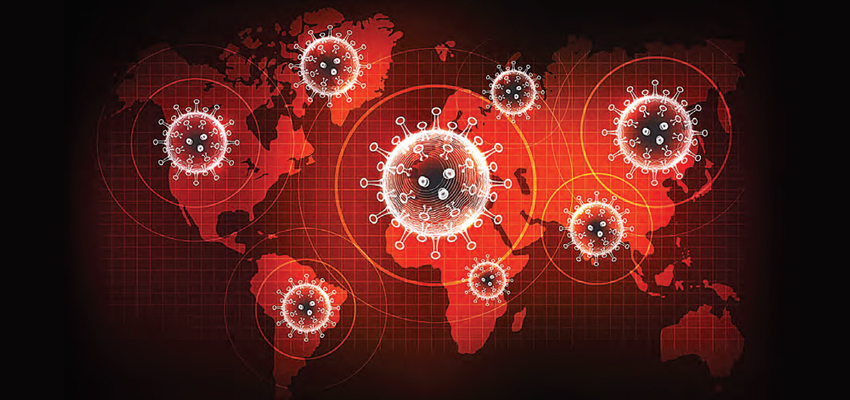The Premise of Employee ENGAGEMENT

The Covid-19 has impacted a lot of people and businesses around the globe. While some enterprises are getting back on track, others are trying to hold their fort. This Black Sawn effect has taught us various lessons and has also showcased that some companies are truly considerate towards their employees, due which the employee engagement is going up. Organisations are transforming their learning and development techniques, and diversity and inclusive has become more important than ever. On the same line, we spoke to Rochelle Aranha, HR team leader, Boston Consulting Group (BCG), India. She pours her heart about employee engagement, business learnings from Covid, diversity and inclusion, and more
"Over the years of my experience in the realm of corporate, I have realised that human beings need a place to belong. Be it a home, family, partner, friend, or a workplace; it needs to be a place where you get support and feel included"

Corporate Citizen: Give our readers a brief background of your corporate journey so far.
Rochelle Aranha: I have been an HR professional for over a decade. During this experience, I got a chance to try my hands on several HR functions like learning and organisational development, onboarding, engagement, retention, diversity and inclusion, and values and culture. This journey gave me an overall essence of human resources. However, I wasn’t always into HR. I started my career as a journalist only to realise what my true calling was. Shortly, I transitioned into HR. For me, this drastic shift was smooth because I addressed my passion. I have a knack for connecting with people and making an impact, this has, in turn, guided my personal and professional choices. I strongly believe that you should make your passion your career if you want to bring your intrinsic motivation to work each day. If you honestly believe in the purpose of what you do every day, you will find meaning in the otherwise mundane tasks. You will also be able to influence those working with you to see the bigger picture.
CC: It is nice to hear that you are following your true passion for connecting with people. Employee engagement, one of your fortes that encapsulates dealing with the employees, has always been important for any company. To be in tandem with this new normal during the Covid-19 times, companies had to walk that extra mile to attend to their employees. So, what has this situation taught you about employee engagement?
Over the years of my experience in the realm of corporate, I have realised that human beings need a place to belong. Be it a home, family, partner, friend, or a workplace; it needs to be a place where you get support and feel included. Our workplace is like our second home. And if the employees truly feel that they are included, they perceive that the organisation genuinely cares for them. And an HR plays a great role in providing with a sense of belonging. It is a well established fact that if you feel affiliated to your workplace, you are more productive. And that indeed is the premise of employee engagement. With jobs and lives being impacted, Covid-19 has proven to be one of the toughest times. It is during such times, that employees look up to their leader with trust and hope. It is super important for leaders to step up on their communication and thoughtfulness to ease out the pressure. We all want to be in a safe space when panic and adversity strikes and organisations need to be able to be that safe space for their people.
CC: Surely the outbreak of Covid-19 was tough on all. And managing both professional and personal life during this uncertain time becomes even more difficult. As a team leader yourself, what is your take on work-life balance?
Enough has been spoken about keeping our personal and professional lives separate. I think that’s a myth these days. There is no such switch that you can turn on and off as per your work and personal life. Your personal life is you, and professional life is just a part of it. What is important to you will be important regardless of the situation. Pre-Covid-19, we had a set work hour, for which we were mentally prepared. There was a clear differentiation between work and personal hours. Now that we are working from home, this timeline has blurred out.
Here is where responsibility and flexibility come into play, and I want to iterate that this is a two way street. As a leader, it is important to understand the different challenges your team members are facing on the home front. There is always a way to accommodate those individual personal needs, while still making time to come together and work as a team. Some important aspects to consider are – dedicated time off, dedicated time at work, flexibility to opt for a reduced capacity model or temporary unpaid leave, frequent non-work-related connects, rigorous checks to avoid burnouts and adequate emphasis on mental health.
At the time when the lockdown was announced, the two major worries were securing groceries and managing the home, and job security. This is where communication plays a great role. It is very comforting to be a part of an organisation that understood this. I was completely against my senior parents stepping out of the house for anything. And my organisation understood that this was important for me. Owing to which I could step out during any time of the day to run errands or cater to domestic needs with ease. And I could also exhibit the same amount of empathy to those I work with. Another aspect that should be given equal importance is supporting mental health and wellbeing. Social isolation, potential burnout and anxiety are not easy things to deal with, and a focus on positive mental health is imperative.
"Social isolation, potential burnout and anxiety are not easy things to deal with, and a focus on positive mental health is imperative"
CC: What are some easy, inexpensive techniques of learning and development which the leaders can use today to strengthen their response to Covid-19?
Continuous learning was pivotal even before the Covid-19 times. And now it has become more important than ever to foster some social interaction and a sense of connect and affiliation. Social learning is nothing but the process of acquiring new behaviours by observing and modelling others. This also gives a boost to engagement that may be dwindling due to remote working models. A lot of us have not got the chance to experience the workplace environment for the last nine months and may not do so soon. This methodology can be embedded in your virtual learning programmes and provide an informal mentorship platform for participants.
CC: Learning and development needs took the forefront in a pandemic hit the world. Especially, in this period, it opened a plethora of new age learning opportunities, not only for the employees but also for the organisations. Could you add to that?
The learning and development world has been constantly evolving. Learner experience and relevance have always been key. I remember at the start of my learning and development journey, which was almost 10 years back, byte-sized learning was the new relevant methodology that catered to Gen Y’s learning needs. Since then, we have come a long way. Times have been changing rapidly there’s a new technology, a new workforce, new business needs and new ways of working. We had moved away from traditional classroom setups towards digital learning long back. Even before the pandemic struck, a lot of organisations were in the process of adopting AI and transitioning into machine learning.
Covid-19 has forced us to rely on technology more than ever, which means employees must be able to operate and work alongside technology tools efficiently this is the first immediate skill that needs to be addressed today. Secondly, with the wave of automation, big data, robotics and more, a lot of us will experience skill gaps shortly. Organisations must facilitate continuous learning opportunities to keep their workforce relevant. In today’s VUCA world, individuals must continuously upskill themselves to remain relevant. Organisations and learning and development teams must remain agile and continue to evolve to cater to growing business and individual needs.
"Organisations must facilitate continuous learning opportunities to keep their workforce relevant. In today’s VUCA world, individuals must continuously upskill themselves to remain relevant"

CC: Are diversity and inclusion initiatives still relevant in these challenging times?
Technology, globalisation, and a few other phenomena have made this world easily accessible. Due to which, diverse groups like women, LGBTQ+ employees, people from different ethnic groups, differently abled employees, people with different religious beliefs and backgrounds, working parents and even hierarchal levels, or specialised roles have become a part of our workforce. They all need a sense of belonging. And this has prompted for diversity and inclusion initiatives to play a great role at times when so much is changing around us. Remote working tends to gradually reduce the emotional connectivity and feeling of inclusion. It is our responsibility to go the extra mile and ensure we connect with diverse groups and individuals of the organisation and pay heed to their unique needs.
For instance, the strain of increased household responsibilities may still be a gendered issue in most Indian households. Similarly, certain groups of people may be grappling with other challenges like mental well-being, workplace health and safety, concerns about career advancement opportunities, stress, and sustainability, etc. respectively. I think reaching out to individuals across the firm, checking on their well-being, listening to their challenges and providing workable solutions are imperative. We need to be empathetic and inclusive if we do not want to lose out on good talent; only because we never paid enough attention to what was important to them.
CC: This year has put us through an array of alterations. And some of us are back to our offices just like the old times. As a team leader, how would you take this opportunity to strengthen the company’s mission?
As every cloud has a silver lining, I strongly feel that the outbreak of Covid-19 has introduced us to newer ways of working, while also creating some voids. As we start getting back to the office, let us look at retaining the most effective practices and getting rid of the inefficient ones from both, the old as well as the new way. For instance, we can cut down on unnecessary office bureaucracy and ineffective meetings and increase flexibility and emphasis on work life balance. We should hold on to the personal connect and pleasure of working together, being able to walk up to your colleagues, answer a query and have coffee together. On a personal front, I think we should also be able to find time for a hobby and choose where we want to live without having crazy travel constraints. A hybrid model is most likely to emerge that balances the best of both worlds and will be a win-win for the employee and the employer. For some, it is mandatory to operate from the office, and we cannot ignore their roles. We need to ensure that this group is adequately supported and equipped.